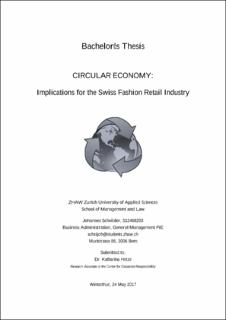Please use this identifier to cite or link to this item:
https://doi.org/10.21256/zhaw-1340| Publication type: | Bachelor thesis |
| Title: | Circular economy : implications for the Swiss fashion retail industry |
| Authors: | Scheibler, Johannes |
| Advisors / Reviewers: | Hetze, Katharina |
| DOI: | 10.21256/zhaw-1340 |
| Extent: | 61 |
| Issue Date: | 2017 |
| Publisher / Ed. Institution: | ZHAW Zürcher Hochschule für Angewandte Wissenschaften |
| Language: | English |
| Subject (DDC): | 363: Environmental and security problems 658.4: Executive Management |
| Abstract: | The concept of Circular Economy is much discussed among experts and in sustainably advanced business contexts such as the 2017 Sustainability Summit in London. Several multinational companies have already joined networks to accelerate the transition into futureproofed business practices. Startups, long-established companies and scientific research are devising groundbreaking solutions to work towards this new business imperative. At its core, the Circular Economy aims at replacing the traditional, linear way of extraction, production, consumption and disposal with a circular model, where waste is considered as a precious resource for new applications. However, it seems that in the Swiss business environment the concept is rather unknown or ignored, even though it is highly relevant considering the current and forecasted macro-economic and environmental developments. “Adapt or die” is one of the more recent statements in the light of environmental pollution, the tightening of resource availability together with population growth and increasing consumption on a global level. Therefore, this Bachelor’s thesis aims to analyze the present status of and to provide guidance for the Swiss fashion retail industry. By means of a multiple-case, embedded case study design, two Swiss fashion retailers are studied within their respective ecosystems. The two units of study were selected to approach a certain degree of external analytic validity, which is the reason why a large multinational and a smaller player with Swiss tradition were chosen. Qualitative and quantitative sources of primary and secondary data are adduced, whereas solely qualitative methods are applied. The assessments are then made inductively on the basis of the business model Recovery & Recycling. It is as such one of five Accenture-devised possibilities for enterprises to embark on a circular future. It was found that successfully employing the Recovery & Recycling business model embraces decoupling in two different ways: decoupling from potentially harmful resources, the environmental perspective and, decoupling from increasingly scarce resources, the economic perspective. The Swiss fashion industry turned out to be rather advanced within the environmental perspective, yet there is room for improvement when it comes to closing the material loop from an economic perspective. Smaller players with limited means are well advised to draw on the many instruments or methods already available and to imitate larger, more advanced players. Finally, some advancements depend on breakthroughs in recycling technology and material sciences. Nevertheless, much can already be improved by efficient design of products and processes in a way that facilitates reuse and recycling. |
| URI: | https://digitalcollection.zhaw.ch/handle/11475/1378 |
| License (according to publishing contract): | CC BY 4.0: Attribution 4.0 International |
| Departement: | School of Management and Law |
| Appears in collections: | BSc Betriebsökonomie |
Files in This Item:
| File | Description | Size | Format | |
|---|---|---|---|---|
| Scheibler_Johannes_W.BA.BO.GM (PiE).pdf | 1.65 MB | Adobe PDF |  View/Open |
Show full item record
Scheibler, J. (2017). Circular economy : implications for the Swiss fashion retail industry [Bachelor’s thesis, ZHAW Zürcher Hochschule für Angewandte Wissenschaften]. https://doi.org/10.21256/zhaw-1340
Scheibler, J. (2017) Circular economy : implications for the Swiss fashion retail industry. Bachelor’s thesis. ZHAW Zürcher Hochschule für Angewandte Wissenschaften. Available at: https://doi.org/10.21256/zhaw-1340.
J. Scheibler, “Circular economy : implications for the Swiss fashion retail industry,” Bachelor’s thesis, ZHAW Zürcher Hochschule für Angewandte Wissenschaften, 2017. doi: 10.21256/zhaw-1340.
SCHEIBLER, Johannes, 2017. Circular economy : implications for the Swiss fashion retail industry. Bachelor’s thesis. ZHAW Zürcher Hochschule für Angewandte Wissenschaften
Scheibler, Johannes. 2017. “Circular Economy : Implications for the Swiss Fashion Retail Industry.” Bachelor’s thesis, ZHAW Zürcher Hochschule für Angewandte Wissenschaften. https://doi.org/10.21256/zhaw-1340.
Scheibler, Johannes. Circular Economy : Implications for the Swiss Fashion Retail Industry. ZHAW Zürcher Hochschule für Angewandte Wissenschaften, 2017, https://doi.org/10.21256/zhaw-1340.
Items in DSpace are protected by copyright, with all rights reserved, unless otherwise indicated.